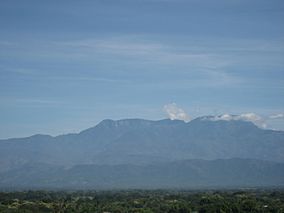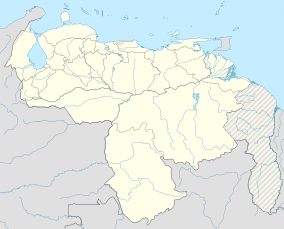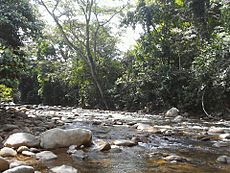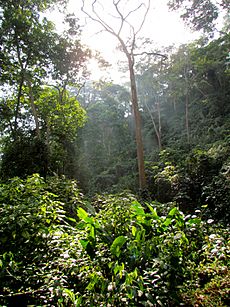Sierra de Perijá National Park facts for kids
Quick facts for kids Sierra de Perijá National ParkPerijá National Park |
|
|---|---|
|
IUCN Category II (National Park)
|
|

Perijá National Park
|
|
| Location | Venezuela |
| Nearest city | Maracaibo |
| Area | 295,288 hectares (729,670 acres) |
| Established | 1978 |
| Governing body | Instituto Nacional de Parques(INPARQUES) ’’National Park Institute’’ |
Perijá National Park, also called Sierra de Perijá National Park, is a special place in Venezuela. It is a protected area, meaning it's kept safe for nature. You can find it in the Serranía de Perijá mountains. These mountains are right on the border with Colombia. The park is southwest of Zulia state and a big lake called Lake Maracaibo. This park was created in 1978 to help protect its beautiful hilly areas.
Where is Perijá National Park?
Perijá National Park is in Zulia State, Venezuela. It covers parts of the Perija and Colon areas. You can get to the park by road from the city of Maracaibo.
The park is part of the Serranía de Perijá mountains. These mountains rise up near the southwest side of Lake Maracaibo. Lake Maracaibo is a large bay that connects to the Gulf of Venezuela. The highest point in the park is a peak called Pico Tétar. It stands about 3,500 meters (11,480 feet) tall. The park is very large, covering about 295,288 hectares (729,670 acres).
Amazing Wildlife and Plants
The park is home to many different types of plants. You can find thick rainforests and cloud forests here. There are also high mountain areas called moors. Even higher up, you'll see sub-alpine and alpine tundra, which are cold, treeless lands.
Some common trees include Anacardium excelsum and tall wax palms. You might also spot Cecropia trees and different kinds of Tabebuia trees. Many herbs, flowering plants, and bromeliads also grow here.
The park is full of interesting animals too! You might see spectacled bears. There are also different kinds of monkeys, like capuchin and howler monkeys. Scientists are working to protect Dolphins in Lake Maracaibo.
Many birds live in the park. This includes parrot species like the military macaw (Ara militaris). This macaw is an endangered bird, meaning it's at risk of disappearing forever. Another endangered bird found here is the Perija metaltail hummingbird (Metallura iracunda). You can also find the Coeligena consita hummingbird. This bird is special because it only lives in the Sierra de Perijá mountains. A new bird, the Perijá tapaculo (Scytalopus perijanus), was discovered here in 2015!
Protecting the Park
Perijá National Park faces some challenges. Uncontrolled fires can harm the natural areas. These fires can destroy plants and animal homes. Cutting down trees, called deforestation, is also a big problem. These threats make it harder for the park's plants and animals to survive. Protecting this park helps keep its amazing nature safe for the future.
See also
 In Spanish: Parque nacional Sierra de Perijá para niños
In Spanish: Parque nacional Sierra de Perijá para niños
 | Aaron Henry |
 | T. R. M. Howard |
 | Jesse Jackson |




